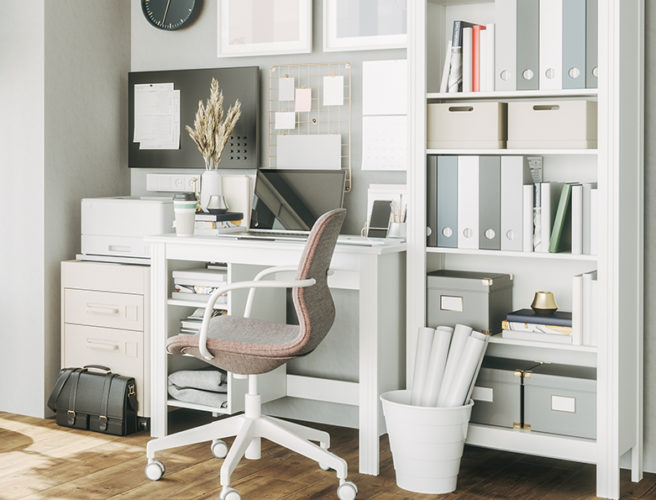
Whether we are still working from home during the pandemic or planning our return to the office, organization is essential for productivity. Your office work space is supposed to be where productivity happens, but it is often overwhelmed with paper piles and other clutter. Whether it is at home or at your office, your desk is meant to be the hub of your productivity, but it sometimes becomes a dumping ground which can cause stress and waste time. Recent statistics reveal that the average person wastes 150 hours per year searching for lost documents.
There is no need to waste time and energy with a cluttered desk. Below are some tips to help you organize your office work space and keep that productive space.
- Everything Needs a Place
As you clean out your office and deal with future paperwork, consider the mantra — everything needs a place. Remember the mnemonic “RAT” for each piece of paper that crosses your desk. That is, you should decide to Retain it, Act on it or Toss it. These same rules apply to e-mails and electronic files. Your computer desktop is not the place for documents to be floating around; they belong in files. As e-mails come in, you should delete them, file them, or read them and reply immediately. - Determine Your Learning Style to Organize Your Work Space
Whether you are a visual learner, auditory learner or kinesthetic learner, it is essential that you clear your office of piles. Whether you use filing cabinets, filing crates or filing boxes is a personal choice. Just make sure you have some sort of filing system. You’ll want to lay out your space so that the files you use most can be stored close to your desk, while the files you access less frequently can be stored farther away. - Become as Paperless as Possible
Only print out paperwork if it’s completely necessary. If you do print something out, recycle it or file it once you’ve completed the task you used it for. - Limit Use of Post-It Notes
Post-its look messy and are easy to lose. Keep a notebook on your desk next to your keyboard instead and get in the habit of using it. If you use it every day, you’re bound to see your reminders written down. - Determine Frequency of Use
If you use something every day, leave it in your desk; if you use something once a week, you should be able to reach it from your chair; if you use something once a month, keep it in your office or work area. If you use something less than once a month, keep it elsewhere. - Keep Office Supplies in One Drawer
Keep only the supplies you use frequently in your desk. Do you really need 25 pens and 15 packages of salt? - Move Electronics (Home Office)
Your cable modem, wireless router, battery backup, etc. shouldn’t be on your desk. Even if you have enough room, it introduces visual clutter. - Think of Paper as Perishable
Once your office or work space is organized, you’ll want to keep it that way. A major part of maintaining order is the way you approach the task. Most people have the skills needed, as evidenced by the way they handle their kitchens. People generally have very clean kitchens and offices are really no different. Food rots so you clean it up and you wipe your counters. If you can use those same skills that you already have in your office, then you’ll maintain it.
To prevent future paper accumulation, treat the paper in your office as if it’s perishable. Don’t pile it up, telling yourself that you’ll deal with it when you have time. You wouldn’t do that with food in your kitchen. Make decisions on the paper immediately. Keep a recycle bin and a wastebasket next to your desk and use them frequently. - Have a routine
End each day (or at least each week) by tidying up your desk and returning everything to its place. Yes, everything should have a place! - Sources for learning styles:
http://schoolhabits.com/how-to-create-a-study-space-9-tips-for-visual-learners/
http://schoolhabits.com/create-study-space-7-tips-auditory-learners/
http://schoolhabits.com/create-study-space-kinesthetic-learners/

Leave A Comment